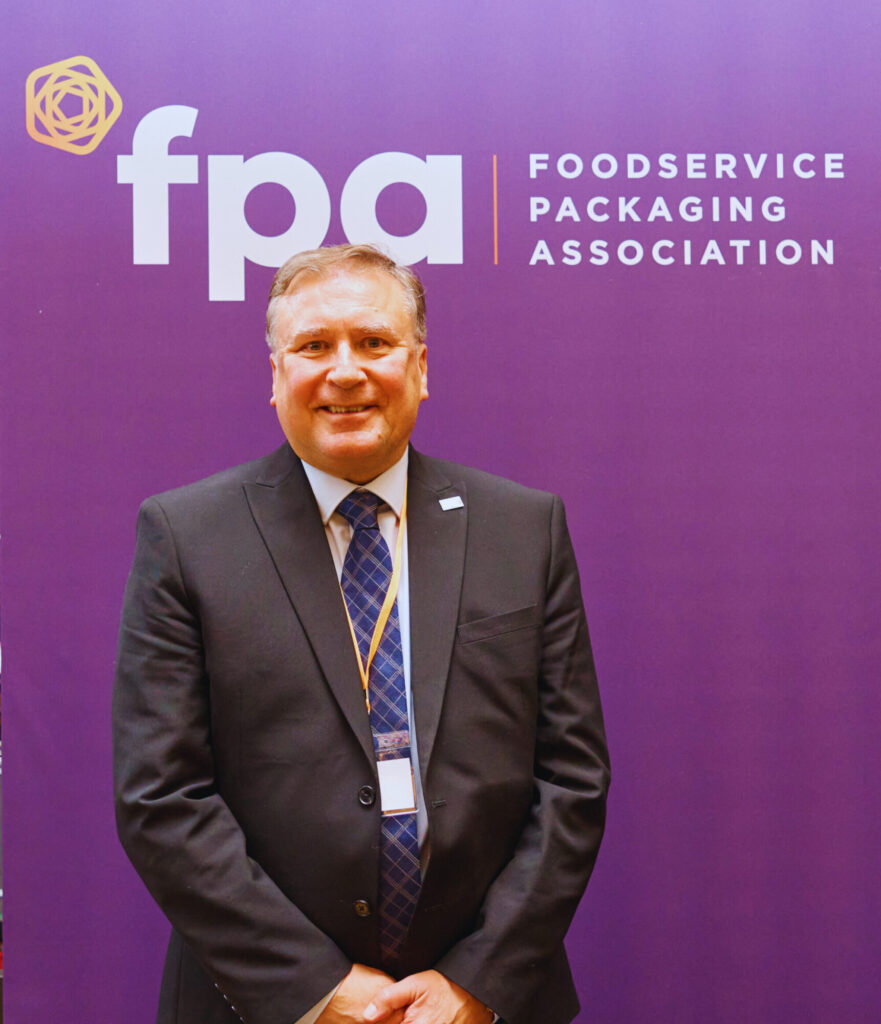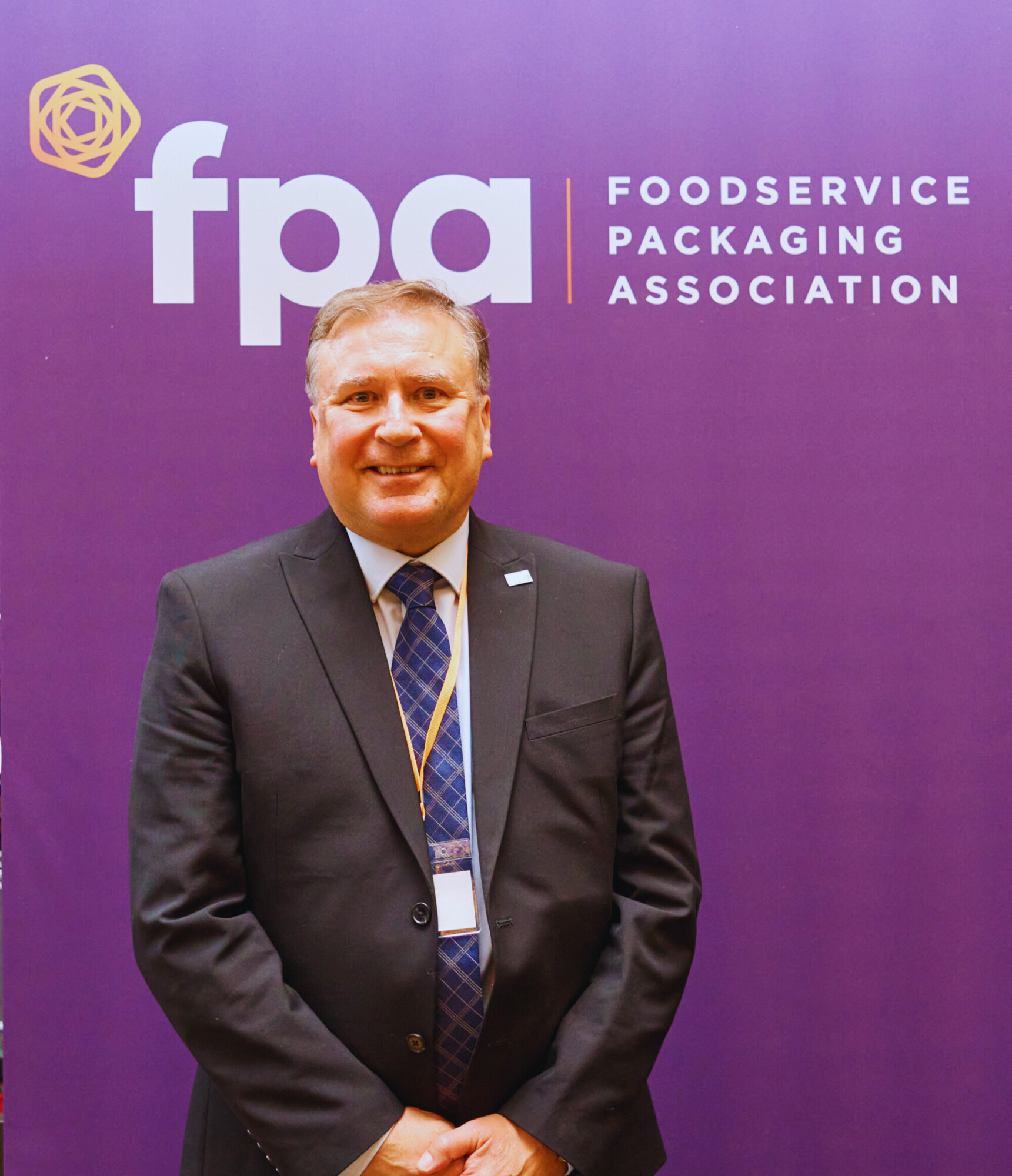Lorem ipsum dolor sit amet, consectetur adipiscing elit Lorem ipsum dolor sit amet, consectetur adipiscing elit
Latest news from Packaging Innovations & Empack
“A fundamental part of the supply chain” – FPA’s Mike Revell on EPR, inflation, and the fight for fairness

There’s a certain irony in the quiet hum of a coffee machine, that familiar soundtrack to British mornings, when you realise how fragile the ecosystem behind that £2.50 cup has become. From the paperboard in its sleeve to the recycled plastic in its lid, every component sits within a web of regulation, reform, and rising costs. Behind the steam and chatter, a silent chain of manufacturers, distributors, and recyclers keeps the ritual alive, one policy decision at a time.
But that chain, long taken for granted, is under unprecedented strain. New taxes, uncertain legislation, and spiralling costs are pushing the foodservice and hospitality sectors towards breaking point. The very packaging that enables convenience, hygiene, and flexibility, which allows food to travel safely from kitchen to consumer, is becoming a symbol of political confusion and public misconception.
At the centre of this storm sits Mike Revell, Executive Chair of the Foodservice Packaging Association (FPA). A man with two inboxes, one for the business he still runs, another for the members he represents, he is both witness and participant in an industry fighting to stay functional. And right now, he says, the emails tell a story of real anxiety. The topics he highlights – EPR, inflation, and regulatory uncertainty – will feature prominently across the Foodservice area of Packaging Innovations & Empack 2026, alongside insights from leading suppliers and FPA members, including eGreen, Huhtamaki, GO-PAK, Sabert, Sharpak, and Intertan.
“Well, at this time I have two email boxes because I’m still running a business in the industry, and I think it’s always good when you’re an Executive Chair to be in the heart of it rather than looking from the outside,” Revell explains. “I would say at the moment there’s real worry about the budget that could really hit hospitality. It’s already been hit because of NIC. You’re going to see more pubs and restaurants closing or going down to three days a week, that’s causing a real worry and uncertainty. And the second one is EPR, because we are now just in the middle of the Extended Producer Responsibility tax. There’s so much uncertainty about it. The clarity is not good.”
As Executive Chair of the FPA, Revell is the voice of hundreds of UK packaging manufacturers, distributors, and suppliers. Their questions, frustrations, and fears fill that second inbox. “The larger businesses are pretty much up to speed,” he says, “but the smaller ones are looking for help, and that’s what most of the emails in my FPA inbox are about at the moment.”

‘The Wild West’ of EPR
For many in the industry, EPR, the Extended Producer Responsibility tax, has become a source of constant tension. “We try to give as much advice as possible. We have a magazine called The FPA Digest that goes out to all our members every Friday, and if anything changes that week, we send them the latest version of what’s happening. But what’s been difficult with this EPR is how grey it all is. It’s not clear, it’s not concise, it could be so much easier. There’s too much red tape, too much administration, duplication; it’s a moving beast.”
What was true last week might not be true this week, he explains, leaving businesses unable to plan. “It’s one of the worst implementations I’ve seen of what is a very important tax. It’s very frustrating that we’re not seeing real, clear, concise leadership from Defra and the government.”
The FPA isn’t opposing the principle of producer responsibility. “We’re not saying that the industry shouldn’t be recycling or contributing, everyone agrees that we need to. The issue is the implementation. It’s damaging for inflation, for administration, and for fairness.”
And that damage could soon hit the high street. “We were given guarantees that no product would be taxed twice. Now we’re seeing some products taxed three times. Some of our members are taking legal advice, and we don’t blame them. If that happens, what does it mean for the consumer? A cup of coffee that costs £2.50 now could cost £8.50 next year. That’s going to cause massive inflation.”
This uncertainty is compounded by a lack of clarity around how tax revenue is used. “Another disappointment is the guarantee that this tax money would go to the areas where it was promised. There’s no real authority over where it’s spent, it’s not ringfenced. We were supposed to see uniform recycling policies across local authorities, with capacity and investment to match. But we now doubt that’s going to happen.”
His solution is refreshingly simple: a VAT increase. “I’ve always said, why not just put 1% on VAT? Then everyone, online trading platforms, importers, everyone, pays a packaging tax. Who is policing EPR registration otherwise? If you had a simple VAT increase, the money would go to the right place. Instead, it’s become needlessly complicated, based on tonnage, with constant data changes that businesses can’t keep up with. That’s why I called it the ‘Wild West.’”
That sentiment resonates widely among members. “All my members came up to me after my presentation last week and said, ‘Mike, that’s exactly how we feel.’ That’s what my role is, to be the voice of the members.”

The pressure on hospitality
The UK hospitality sector is already grappling with multiple pressures, rising energy bills, staffing challenges, and minimum wage increases. Packaging is a hidden casualty of these pressures, and yet it is essential. “At the moment, all this uncertainty keeps bubbling up, one issue after another, and it feels never-ending. If it continues, we’re heading towards that £8.50 coffee scenario. And people might finally sit up and take notice when that happens.”
Revell is clear that the industry should not feel guilt over packaging use. “We mustn’t feel guilty about what we do. The issue is litter, and sometimes that’s out of our control. Look at big fast-food chains, half their business is takeaway. If they stopped using disposables tomorrow, half their business would disappear and thousands of people would be unemployed. There’s a lack of understanding that our products are a crucial part of the supply chain that makes hospitality work. Without them, the industry would grind to a halt.”
This perspective underlines a larger tension: society demands sustainability, but the mechanisms for achieving it often fall short. Misaligned incentives, poorly enforced regulations, and uneven implementation place a disproportionate burden on the manufacturers and retailers who are, in practice, already driving change.
Innovation and the path forward
Despite the regulatory frustrations, the UK packaging sector is innovating at pace. “I have to applaud our members, especially the manufacturers, for their innovation. They’ve reduced waste, created more sustainable products, and explored materials suitable for composting or recycling. The innovation driven by what’s around the corner has been amazing.”
Revell cites clear examples of the market shifting. “How many salad containers now are actually a board product with an RPET lid? This is innovation and once the big users start to use it, the economy of scale makes it easier for the rest of the market to follow.”
But the ultimate goal remains elusive: truly plastic-free coating on Board recyclable packaging. “That would be like breaking the four-minute mile. There are certain new materials on the market, and we’re hopeful they can be produced at scale. Some of the new materials are performing really well, and I’d like to think that in two years we’ll have a plastic-free sandwich pack or cup. But it must also be recyclable.”
Composting, he notes, remains a challenge. “Compostable products are great, but we don’t have enough composting units across the UK. Recycling remains key. A non-plastic coating product that can be recycled would make a big difference.”

Raising standards and fighting greenwash
Alongside product innovation, the FPA is actively creating systems of accountability. “Around six to nine months ago, we established an impartial compliance team to check member and non-member websites for misleading claims. It’s been a major step forward. The next one is an accreditation system, ‘Approved by the FPA,’ for products that meet high standards, particularly around food safety. It gives confidence to the end user and helps raise standards across the board.”
Revell sees accreditation as a way to support innovation while removing greenwashing. “We’re trying to bring other things in that support innovation, making sure we’ve got the scientific support, taking out greenwashing from the market as much as we can. Other industries have accreditation schemes, and I do believe it’s a major step forward, not just for manufacturers but also for distributors and customers.”
The need for expertise and accountability
One of Revell’s recurring frustrations is the lack of packaging expertise at policymaking level. “I’ve attended consultations in Westminster where there wasn’t a single person from the packaging industry on the other side of the table. You’d expect some high-profile packaging experts there to offer advice and practical knowledge. Instead, the few people present seemed to have only a couple of years of experience. There’s this perception that packaging is ‘dirty,’ that we’re automatically in the wrong, without understanding how vital this industry is to jobs and the economy.”
Despite this, he remains cautiously optimistic. “I’ve met the new people from Pack UK, very impressed. They are in dialogue with local authorities. I think there will be certain criteria or guidelines. If they’re implemented and local authorities can be held to account, that will ensure the money goes where it should.”
Restructuring the FPA for the next decade
Revell’s current tenure is about legacy and reform. “This is my second spell at the FPA. The first time I was here, 20 years ago, it was called the British Disposables Products Association. I rebranded it to the Foodservice Packaging Association and put proper structures in place to prepare for these kinds of challenges. Now, we need to restructure again for the next five to ten years to meet members’ demands, and to prepare for the next surprise around the corner.”
The association’s board has grown from four to nine, including leading UK manufacturers. “We’re rewriting the constitution; the old one wasn’t fit for purpose. There’s a lot going on behind the scenes alongside tackling EPR and other challenges.”
PR and networking also remain central to FPA’s work. “We’ve done great work on PR, especially the FPA Digest, it goes out to over 100 companies, including Defra and Pack UK, the very people we’re holding to account. We’re challenging and engaging constructively, that’s exactly what we should be doing.”
“We Should Not Feel Guilty”
Revell concludes with a point of principle, one that defines his leadership.
“We are the experts in packaging, and if the government would really listen to us, it would help a lot with legislation. But for the moment, everything is still very fluid and uncertain.
“My view is that we should not feel guilty about the industry we’re in. We are an important part of the supply chain that makes everything work. Wherever you go out to dinner tonight, we’re involved somewhere along the line. By punishing that link, you punish the whole industry. In hospitality and foodservice, around 60% of all food and drink goes out in our products. It’s a fundamental part of the supply chain, but one that’s often taken for granted.”
Don’t miss the chance to see how the sector is responding to these pressures. Register for your free ticket to Packaging Innovations & Empack and explore the latest innovations, insights, and solutions shaping the foodservice packaging landscape.
Share this article

Lorem ipsum dolor sit amet, consectetur adipiscing elit Lorem ipsum dolor sit amet, consectetur adipiscing elit
Latest news from Packaging Innovations & Empack
Lorem ipsum dolor sit amet, consectetur adipiscing elit. Ut elit tellus, luctus nec ullamcorper mattis, pulvinar dapibus leo.



